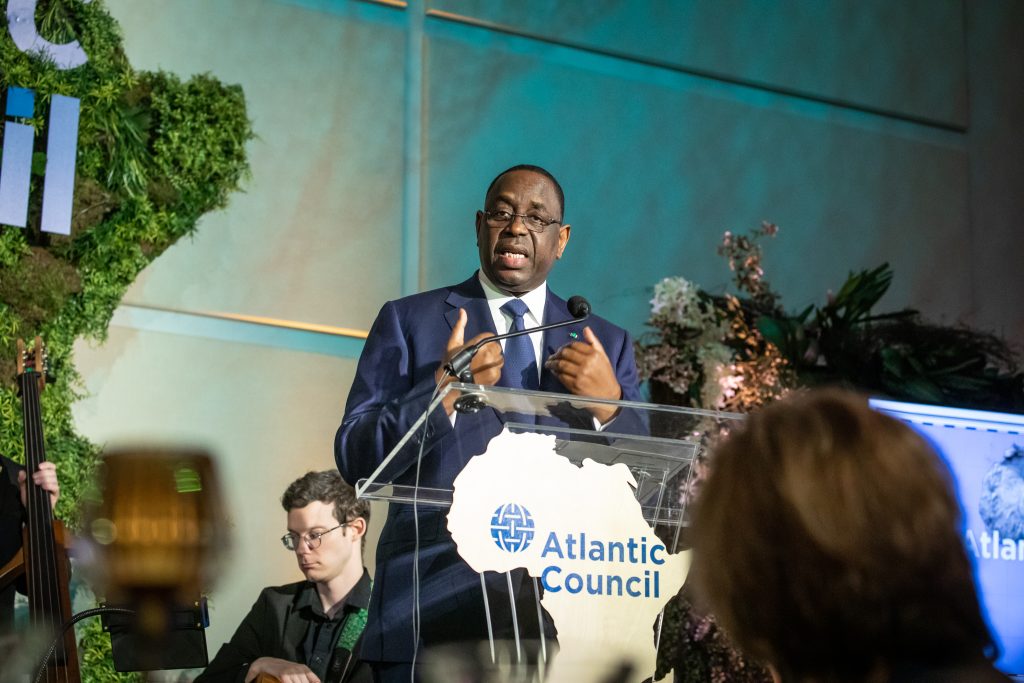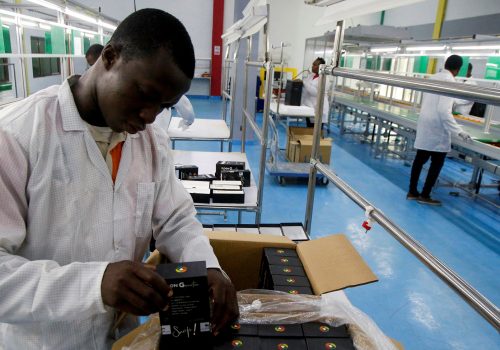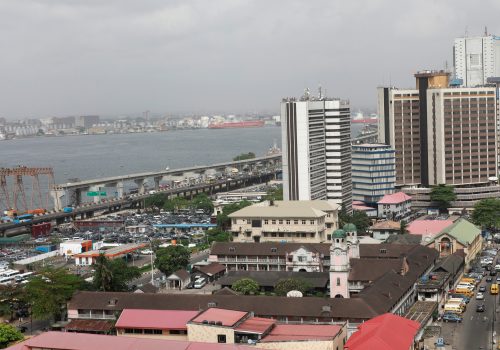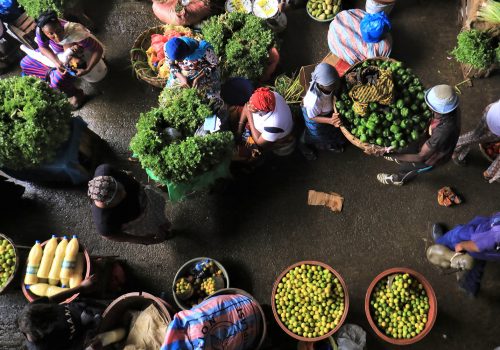Below are the remarks of Senegal President and Chairperson of the African Union Macky Sall as prepared for delivery at an Atlantic Council dinner in Washington on December 12, 2022, ahead of the US-Africa Leaders Summit.
Dear colleagues, ministers, members of Congress, ambassadors, representatives of the private sector, the academia, and civil society; dear guests.
I would like to thank the [chairman] of the Atlantic Council, Mr. John Rogers, and its CEO, Mr. Frederick Kempe, for their kind invitation, as well as my compatriot, Ambassador Rama Yade, who has been following up on this for several weeks. I greet and thank all the colleagues, personalities, and other guests gathered here.
I appreciate the efforts that the Atlantic Council has been making for several decades in the analysis and reflection on global issues and challenges facing the world. In my opinion, the place of Africa in contemporary international relations is one of these issues.
More than sixty years after our independence, Africa is still hemmed in on the world stage, and prejudices against the continent remain tenacious. We must therefore continue to advocate, explain, deconstruct unfounded narratives, demand justice and equity, and re-establish historical truths.
Sixty years ago, the vast majority of African countries gained their independence after five hundred years of slavery and colonization. This handicap is unparalleled in the history of humankind. But Africa is still here, alive and resilient.
My view is that despite this historical wrong and the challenges of the day, Africa is moving generally in the right direction. It is true that the cumulative effects of the COVID pandemic and the war in Ukraine have seriously slowed down the dynamics of African growth, which has been regularly higher than the world average in recent years, but the momentum of Africa’s emergence seems irreversible to me.
It is up to us to support this ambition for progress in the fully assumed responsibility of an Africa that does not have any complexes, that makes its own story, carries its own vision of the world, makes its choices in its best interests, and builds its own destiny.
In a way, I can echo here what the founding fathers of the United States Declaration of Independence affirmed 246 years ago, by saying the time has come for Africa to assume among the powers of the earth, the separate and equal station to which the laws of nature and of nature’s God entitle her.
And Africa has the potential to assume that station, with its thirty million square kilometers, 1.4 billion inhabitants, large water reserves, 60 percent of the world’s undeveloped arable land, 40 percent of the world’s gold reserves, 85-95 percent of the world’s chromium and platinum group metal reserves, 85 percent of the world’s phosphate reserves, more than 50 percent of the world’s cobalt reserves, one third of the world’s bauxite reserves, 12 percent of the world’s oil reserves, and a world-class new gas calling.
What we need today is to work on improving the conditions for exploiting these resources.
This requires qualified human capital in sufficient numbers, by further developing technical and vocational training at all levels so that our countries can have human resources capable of supporting the structural transformation of their economies. Without quality human capital, the demographic dividend will be more of a handicap that hinders our development efforts than a force that supports our economies.
The pursuit of Africa’s integration seems to me to be just as fundamental, not only at the political level, but also at the economic and commercial levels. This has been the purpose of the gradual establishment of the African Continental Free Trade Area, to which the African Union devoted an Extraordinary Summit on November 25.
But beyond the texts, it is also through infrastructure that we will be able to enable the free movement of people and goods, which is essential for integration. With the Program for Infrastructure Development in Africa (PIDA), we want to invest more in the construction of roads, highways, ports, airports, and railroads in order to catch up in this area.
I must say that for a long time, several countries and partner institutions showed little interest in this strategic sector. Today, everyone realizes that the development of such profitable infrastructures is an important niche of opportunities for investors and host countries, especially through PPPs.
All our partners, old and new, are welcome on these projects. While keeping their traditional friendships, our countries are also opening up to new horizons. Openness is the very meaning of history.
Beyond our national and continental responsibilities, Africa’s place in the international system also depends on fairer and more equitable global governance. This is what the advocacy that I have been leading since the beginning of my mandate at the head of the African Union on several fronts is all about.
First, for the consistent financing of African economies, we believe it is necessary for the OECD to reform the conditions of access to export credit, by relaxing the rules on credit rates and the duration of grace periods and repayment periods. This would make it possible to mobilize more resources for the financing of development projects, including through private investment and public-private partnerships.
Second, we need to do more to combat abusive tax holidays, tax evasion, and tax optimization, which deprive our countries of significant financial resources, even though taxes should be paid where the activity generates wealth. It is fortunate that, at the initiative of the United States, the OECD adopted in October 2021 a landmark agreement on a 15 percent global minimum tax. This is a significant step in the fight against irregular tax practices that contribute to tax base erosion.
In addition, we need to do more on improving the assessment methods of rating agencies. It has been noted that African countries continue to be penalized by an exaggerated perception of risk that increases insurance premiums and the cost of investment.
The 2022 Financing for Sustainable Development Report published last April by some sixty international institutions, including the IMF and the World Bank, also noted the limitations of these assessments and recommended that the assessment criteria better reflect the real situation of each country.
Finally, we want a fair and equitable energy transition that enables our countries to use their own resources to address their industrialization needs at competitive costs and ensure universal access to electricity, of which more than six hundred million Africans are still deprived. As noted at COP27, when it comes to climate change adaptation, it is our countries that tend to finance their green projects, including infrastructure, through debt, as agreed financial commitments to support developing countries’ adaptation efforts have been slow to materialize.
In addition to these economic, financial, and environmental considerations, we are advocating for a more equitable representation of Africa in global governance bodies such as the United Nations Security Council and the G20, so that its interests are better taken into account.
Finally, what Africa is calling for in terms of a different vision of the world is not a revolution, but a simple evolution for more justice and equity in international relations. It is a legitimate demand to which we want to associate all our friends and partners. I hope that the Atlantic Council will help to amplify this advocacy.
These are the few remarks I would like to make here, while waiting to deliver Africa’s message to our summit. Thank you for your attention.
Further reading
Tue, Dec 13, 2022
US-Africa Leaders Summit could make history—if leaders recalibrate trade relations
AfricaSource By
Africa has been squeezed into a limited role in global value chains. But leaders in Washington this week can rebalance the US-African trade relationship—and fulfill Africa's economic potential.
Fri, Dec 2, 2022
The Africa investment imperative: Diversification and resilience amid economic downturns
AfricaSource By
At a time when investors are faced with high risks due to a global economic downturn, African markets are a viable investment opportunity.
Tue, May 25, 2021
Africa is America’s greatest geopolitical opportunity. Does the US know it?
AfricaSource By Rama Yade
Biden can further build ties with Africa: He should do so not only because these countries have long been underrepresented within leading multilateral organizations, but also because they offer innovative solutions to global challenges including terrorism, climate change, migration, debt, and COVID-19.
Image: Macky Sall, president of Senegal and chairperson of the African Union, speaks at an Atlantic Council dinner at the Renwick Gallery in Washington on December 12, 2022. Sall and other African leaders gathered for a dinner ahead of the US-Africa Leaders Summit.



